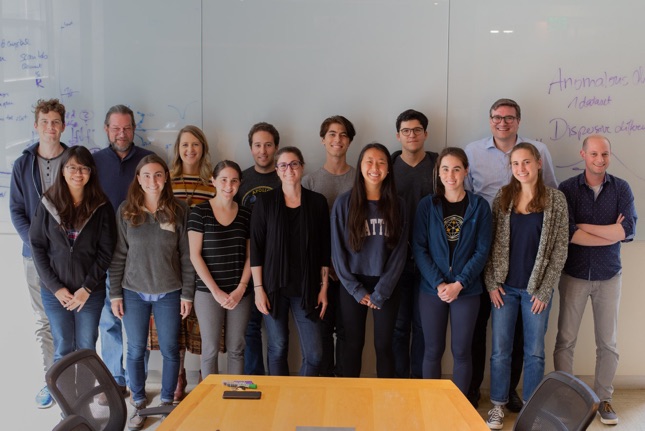Hoelz Lab: Teaching
Chem 1A/B general Chemistry
6 units (3-0-3) first term; 9 units (4- 0-5) second term:first, second terms. Lectures and recitations dealing with the principles of chemistry. First term: Chemical bonding-electronic structure of atoms, periodic properties, ionic substances, covalent bonding, Lewis representations of molecules and ions, shapes of molecules, Lewis acids and bases, Bronsted acids and bases, hybridization and resonance, bonding in solids. Second term: Chemical dynamics-spectroscopy, thermodynamics, kinetics, chemical equilibria, electrochemistry, and introduction to organic chemistry. Graded pass/fail.
Instructors: Lewis (a), Chan, Hoelz (b).
Chem 10/A/B/C
Chem10 is a weekly seminar introducing the wide range of research currently being performed in the Caltech chemistry department. Each week, a faculty member of the department presents an area of their current research. The topics are addressed at an informal introductory level. Research papers are provided each week to acquaint the student with the topics to be presented. Additionally, there are laboratory tours of each of the faculty members to acquaint the students with the laboratory techniques and instruments used in the research.
Instructors: Hoelz, Dervan.
Course webpage: http://www.its.caltech.edu/~ch10/
Bi/Ch113
Lectures and recitation on the biochemistry of basic cellular processes in the cytosol and organelles, with emphasis on membrane and protein trafficking. Specific topics include protein secretion, virus entry, endocytosis, endoplasmic reticulum dynamics, nuclear trafficking, autophagy, apoptosis, and mitochondrial dynamics. The relationship of these processes to human disease will be discussed.
Instructors: Hoelz, Chan.
Course webpage: http://www.its.caltech.edu/~bich113/home.html
BMB 170C
This course focuses on specific topics that can incorporate broadly the lessons, concepts and techniques learned during BMB170a and BMB170b. The goal is to reinforce these concepts and techniques through real case studies of macromolecular assemblies in biology. The emphasis will be on the key experiments that lead to our current understanding of the biological system under investigation. This year, five topics have been chosen: regulated proteolysis, statistical mechanics, chaperones, nuclear transport and the NPC, and channels.
Instructors: Hoelz, Shan.
Course webpage: http://saf.bio.caltech.edu/bi170c/
BMB/Ch 230. Macromolecular Structure Determination with Modern X-ray Crystallography Methods. 12 units (2-4-6); third term. Prerequisites: BMB/Bi/Ch 170 and consent of instructor. Advanced course in macromolecular crystallography integrating lecture and laboratory treatment of diffraction theory, crystallization (proteins, nucleic acids and macromolecular complexes), crystal characterization, X-ray sources and optics, crystal freezing, X-ray diffraction data collection (in-house and synchrotron), data reduction, multiple isomorphous replacement, single- and multi-wavelength anomalous diffraction phasing techniques, molecular replacement, electron density interpretation, structure refinement, structure validation, coordinate deposition and structure presentation. In the laboratory component, one or more proteins will be crystallized and the structure(s) determined by several methods, in parallel with lectures on the theory and discussions of the techniques.
Instructor: Hoelz.
Course webpage: http://ahweb.caltech.edu/AH_Web/BMB_230_Spring_2022.html

California Institute of Technology
Division of Chemistry & Chemical Engineering
1200 E. California Blvd.
Pasadena, CA 91125-7200
© Copyright Hoelz Laboratory


BMB 230, Spring 2019
Back row: Taylor Stevens, Jens Kaiser, Chelsey VanDrisse, Lucas Schaus, Sho Harvey, Stefan Petrovic, Andre Hoelz
Front row: Cai Tong Ng, Claudia Jette, Sarah Speed, Alexandra Barbato, Krystal Brodsky, Bonnie Brown,
Leah Soldner-Garcia, Ferdinand Huber